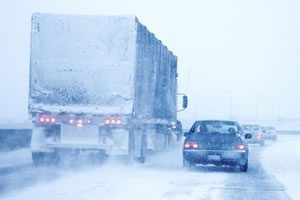 - Client Reviews
- Client Reviews
Windsor, Ontario, has a humid continental climate that has four distinct seasons including; summer, fall, winter, and spring. With these seasons comes a great variety of different weather patterns. This means that drivers must be prepared to take on heavy rain, ice, snow, thunderstorms, hail, strong winds, extreme heat, and extreme cold temperatures every year.
Although many drivers are used to such conditions, and are able to adjust their driving habits, on occasion drivers may lose control of their vehicle and cause and accident. These accidents may be single or multiple car accidents, which may be more severe depending on the weather condition and speed of travel.
The car accident lawyers at Greg Monforton and Partners believe that if you or a loved one has been injured by a negligent driver in bad weather conditions, the victim may be entitled to compensation for their losses and damages including; pain and suffering, property damages, lost wages, medical expenses, and funeral expenses.
Find out how our law firm can help by completing the Free Case Evaluation on the right.
Safety Tips for Driving in Adverse Weather Conditions
Each year in Ontario, there are dozens of auto accidents caused by negligent drivers in bad weather conditions. Of course, even the most responsible drivers who practice defensive driving techniques may have difficulty driving in such weather conditions. Therefore, as responsible members of this community, our lawyers have gathered some safety tips for driving in adverse weather conditions.
Ten easy adverse weather driving tips to remember include:
- Prepare All drivers should be prepared for adverse weather conditions no matter where they are driving. It is also recommended to carry certain supplies in case of an emergency including; extra clothing, flashlight, blanket, sand or salt, food and water, windshield scraper, windshield wiper fluid, traction mat, jumper cables, and an extra gas tank.
- Pre-Trip Inspection Prior to taking your vehicle on a trip, it is always advised to perform a quick inspection on the tires, fluid levels, wiper blades, and lights. This will assist in avoiding becoming trapped on the side of the road in an unknown location.
- Reduce Speeds Driving at excessive speeds in adverse conditions will greatly increase your chance of being involved in an accident. When drivers travel at faster speeds, especially in bad weather, they reduce their ability to manoeuvre around sudden hazards which may occur.
- Allow More Space Allowing more space for the vehicle travelling in front of you will allow for greater stopping distance and your vehicle to move out of harms way.
- Grip the Wheel While driving in bad weather, drivers should firmly hold the steering wheel to increase maneuverability through snow, heavy wind, rain, and ice. It is also advised not to make any sudden movements which could decrease your traction and control.
- Acceleration and Braking It is recommended not to perform any forced movements in bad weather. Thus, pumping your brakes while slowing down will allow you to stop quicker, while accelerating slower will allow you to maintain an increased amount of traction.
- Black Ice This is a thin layer of transparent ice which forms when temperatures near freezing. It also gives the appearance that the road is wet, even though ice has already formed. A way to recognize if there may be black ice is to look for ice buildup in mirror arms, the top of the windshield, and if no spray is occurring from the tires of other vehicles.
- Bridges Typically bridges will be the first to freeze in cold weather conditions, while they are often left untreated for ice and snow along different areas of the road.
- Mountain Driving While driving through mountains there will typically be greater gusts of wind along with a smaller area to manoeuvre vehicles. It is advised to pay attention for emergency vehicles and snowplows in these regions. Furthermore, when driving through an avalanche zone, it is highly advised not to stop in these areas.
- Get Off the Road When conditions become too bad for driving, it is recommended to stay off the road, or pull your vehicle over to the side of the road. When doing this, it is recommended to pull over as far as possible and activate your hazard lights to increase your visibility.
These tips may be able to assist drivers when they face adverse weather conditions, and even assist drivers under normal driving circumstances. Remember, in any emergency situation, it is recommended to dial 9-1-1 immediately.
We’re Here To Help With Your Damages Claim
At Greg Monforton and Partners, our team of experienced Windsor personal injury lawyers have a deep sympathy for injured victims of car accidents and believe that if you or a loved one has been injured in an accident, the victim may be eligible to receive compensation for all losses and damages. Our lawyers will fight for the maximum compensation benefits available as though you were a member of our family.
With our office located in Windsor, Ontario, our lawyers are bale to serve throughout the entire province and elsewhere required. A few of the areas our law firm serves include:
- Hamilton
- London
- Markham
- Mississauga
- Niagara Falls
- Toronto
- Walkerville
- Stratford
- Guelph
Our lawyers also serve the surrounding towns, cities, and suburbs of these areas all while operating on a contingency fee basis. This means that we will not get paid unless you recover for your losses and damages.
To begin exploring your legal options, we invite you to call us today at (866) 320-4770 or click “here” to reach us online.

